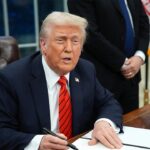Eggs for sale at 74.9 cents each at a supermarket on Feb.10, 2025, in Monterey Park, California.
Frederic J. Brown | Afp | Getty Images
What do arthouse movies and U.S. interest rates in 2025 have in common? There’s a chance both will have no cuts.
The 3% figure for 12-month headline inflation hasn’t been seen since June. While it’s just 10 basis points higher than the 2.9% reading in December, the psychological shock of seeing that number — the way a $2.99 coffee might seem a lot cheaper than a $3 one — is already causing traders to lower their bets of an interest rate cut in the first half of the year, or of one happening at all in 2025.
That is, if the U.S. Federal Reserve is allowed to operate as the independent body that it has traditionally been. Seemingly changing his mind again, U.S. President Donald Trump has reiterated that interest rates should go down — while his tariffs, ranging from country-specific to industry-targeted to reciprocal ones, are implemented.
Wall Street seemed unprepared on how to take the news. Lower rates are mostly good news for investors, but tariffs are generally bad for prices. Stocks fell, but not as dramatically as some of the art movies do.
What you need to know today
Annual U.S. inflation hits 3%
The U.S. consumer price index rose 0.5% month on month in January and 3% for the year, the Bureau of Labor Statistics reported Wednesday. Both figures were higher than the Dow Jones estimate of 0.3% and 2.9%, respectively. Core CPI, which excludes food and energy prices, was also higher than expected. The hot inflation report dimmed hopes of more interest rate cuts this year by the U.S. Federal Reserve.
Trump reiterates rates should be cut
U.S. President Donald Trump said Wednesday that he thinks rates should come down, posting on Truth Social, “Interest Rates should be lowered, something which would go hand in hand with upcoming Tariffs!!! Lets Rock and Roll, America!!!” The Trump administration’s position on interest rates has been inconsistent. Trump said in January that he would demand interest rates drop “immediately” but subsequently said the Fed keeping rates unchanged in January was “the right thing to do.”
Trump to announce reciprocal tariffs on Thursday
Reciprocal tariffs by the U.S. could be announced by Thursday, press secretary Karoline Leavitt told reporters at the White House on Wednesday. Trump said Sunday that he plans reciprocal tariffs on “every country” that imposes import duties on the U.S. “Very simply it’s if they charge us, we charge them,” he said on Air Force One, NBC News reported. On Monday, Trump signed an order to impose 25% tariffs on steel and aluminum imports.
U.S. markets dip and Treasury yields jump
A hot CPI report singed U.S. stocks on Wednesday. The S&P 500 fell 0.27%, the Dow Jones Industrial Average lost 0.5% and the Nasdaq Composite was slightly above the flatline. Higher-than-expected prices also sent the U.S. 10-year Treasury yield above 4.6%. Asia-Pacific markets climbed Thursday. Australia’s S&P/ASX 200 hit a record intraday high but pared gains to close flat.
[PRO] Take caution over active ETFs: Analysts
Investors have been flocking to actively managed exchange-traded funds, with their assets under management growing five times more than those of passive funds in 2024, a Morningstar report showed. But some analysts have raised concerns over whether their returns justify the higher expenses and other risks.
And finally…
Chinese businesses rush to try DeepSeek AI at ‘unprecedented’ scale
DeepSeek took the world by storm demonstrating that its AI model was on par with the most advanced ones in the U.S., while claiming to cost a fraction less. Eight automakers including BYD, at least nine financial securities companies, three state-owned telecommunications operators and smartphone brand Honor are among the many that have rushed in the last week to integrate with DeepSeek.
“This is quite unprecedented,” Wei Sun, principal analyst of artificial intelligence at Counterpoint Research, said in an email Monday. She pointed to the rate of adoption, scale of business integration and breadth of specific industries covered. “When we have all of these, we know it’s making a big social and economic impact,” she said.







